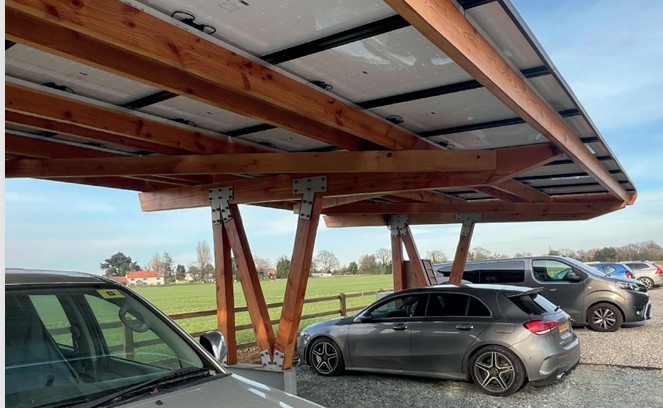The answer to reducing rising energy costs for golf clubs could be found in their existing car parks through the use of solar carports, according to new research.
Renewable energy specialist, RenEnergy, has identified over 29,000 suitable parking spaces across 306 golfing facilities that could be fitted with canopies holding solar PV panels. If installed, this could have the potential to generate 69GWh of clean power per year – the equivalent annual consumption of 19,000 homes.
With over 2,500 golf courses across the UK, the ongoing independent research has only ‘scratched the surface’ on the amount of clean energy that could be produced to support courses.
Due to inflation and rising costs within the hospitality and leisure sector, many clubs are struggling to afford their growing bills. The high energy consumption from buildings and services, lighting and irrigation systems, and EV charging for buggies and customer vehicles contributes significantly to the elevated costs for golf courses.
If golf courses elect to install solar carports, they can take back control of their energy security and recover costs, allowing them to reinvest it in other areas to improve efficiency and customer experience.
Unlike rooftop solar panels where landowner or planning permission may be required, solar carports can gain approval within eight weeks under permitted development with prior approval. Following this, sites must gain approval for the District Network Operator (DNO) to secure grid capacity and export.
By using land that golf courses already have available to them, they can mitigate the costly expense that comes with energy bills and even sell any unneeded excess back to the grid. The installation of the ports can also be free of charge if businesses elect to enter into a Power Purchase Agreement (PPA) with a provider such as RenEnergy where they only pay for the power that they use at a lower rate than grid energy.
This also provides an opportunity to design bespoke solutions that make the most of the course’s site to provide solar power for all operations, from vehicle charging to powering clubhouses and maintenance buildings. An example of this is RenEnergy’s work with golf clubs to design solutions that combine carports with roof-arrays on buildings such as greenkeepers sheds and practice range roofs to maximise production for the facility.
Damian Baker, Managing Director of RenEnergy, said: “For golf courses worried about rising energy costs and insecurity, taking back control by installing solar carports not only offers businesses with the change to regain funds, but to do so sustainably. Without perhaps even realising it, courses have ample space already available to help generate all the power they require. They just need to investigate all the additional options available to them.
“Our research has only scratched the surface on the number of spaces that could be transformed within the golfing sector and allow them to produce their own power.”
In countries such as France and Slovenia, the installation of solar carports is mandatory in car parks with more than 80 spaces to help produce clean power for businesses and homes. By following in their footsteps, the UK could help solve its energy uncertainty concerns.
Damian adds: “Golf courses should take this opportunity in front of them where they could have solar carports installed free of charge, with no need for planning permission and gain energy at a reduced rate. All while producing it sustainably.”
For more information about how solar carports could transform energy security at a golf club, please click here.


